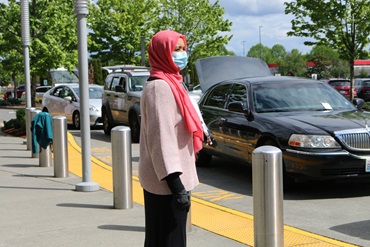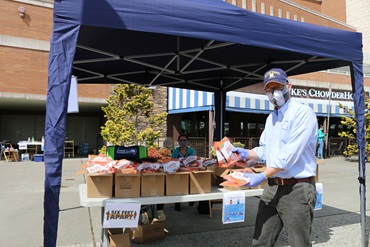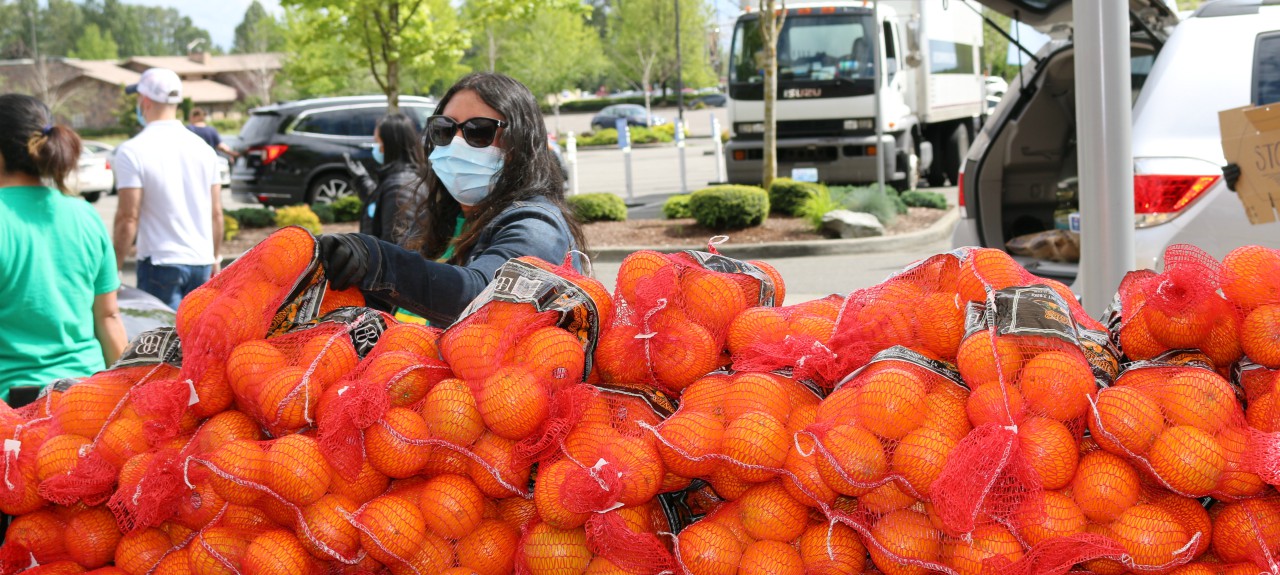COVID-19 Response Fund grantees help families celebrate by providing holiday food.
By Aaron Robertson, Managing Director, Policy and Civic Engagement
 Celebratory music played as the pop-up food distribution event started last Sunday at the Westfield Southcenter parking lot in Tukwila. A team of socially distanced community volunteers directed traffic and shuttled pallets of food between delivery trucks, food stations, and the trunks of waiting cars, including many Ubers and taxis—a sign of the dried-up gig economy.
Celebratory music played as the pop-up food distribution event started last Sunday at the Westfield Southcenter parking lot in Tukwila. A team of socially distanced community volunteers directed traffic and shuttled pallets of food between delivery trucks, food stations, and the trunks of waiting cars, including many Ubers and taxis—a sign of the dried-up gig economy.
The people there were preparing for Eid al-Fitr, which starts the evening of May 23 and is the culmination of the holy month of Ramadan. In just over an hour, 450 families received food for their holiday meals: 25 pounds of flour, 10 pounds of sugar, 8 pounds of oranges, 48 ounces of cooking oil, and a package of dates.
This “Tukwila and Skyway Muslim Residents Iftar Meals” event was the brainchild of Somali Parents Education Board and Tukwila Children’s Foundation, who together organized and promoted it in just 10 days. Both organizations lead collaborative efforts that received $75,000 grants from the COVID-19 Response Fund to support food access in Skyway and Tukwila, respectively. Local organizations such as Easy Company Moving, Para Los Ninos, Tukwila Parks and Rec, and others donated time and resources to make the event possible.
“This time of year is all about community. It’s the joy of being and belonging—neighbors usually share meals. But this year there’s a sense of isolation. We’re thinking: How can we make Eid happen at home?” explained Regina Elmi, co-founder of the Somali Parents Education Board.
 Last weekend’s event was just one of many efforts to ensure that families have food to share for the month of Ramadan, a time of intensified prayer, fasting, and giving of alms. Food is an important component of Ramadan, especially breaking fast with an evening meal or iftar. Each day, families gather after sundown—often with neighbors and friends—to celebrate iftar. Mosques, with food donations from their congregants, host iftar for people in the community who do not have local family or lack the resources to hold their own celebrations. These joyful gatherings are a mainstay of Ramadan.
Last weekend’s event was just one of many efforts to ensure that families have food to share for the month of Ramadan, a time of intensified prayer, fasting, and giving of alms. Food is an important component of Ramadan, especially breaking fast with an evening meal or iftar. Each day, families gather after sundown—often with neighbors and friends—to celebrate iftar. Mosques, with food donations from their congregants, host iftar for people in the community who do not have local family or lack the resources to hold their own celebrations. These joyful gatherings are a mainstay of Ramadan.
But this year, social distancing measures and economic hard times have made Ramadan and Eid very difficult. Community groups are getting creative and working fast to ensure that people have enough to eat, especially for the Eid celebration. Below are a few examples of these extraordinary efforts.
East African Community Services has been providing food and other essential resources to 80 families each week during Ramadan. The organization focuses on the needs of senior citizens, who are sometimes left to fend for themselves while their adult children struggle to feed themselves and their own children.
Living Well Kent has been providing packaged food to over 120 immigrant and refugee families each week through community outreach workers, curbside pickup, and connections with childcare business owners and their families. Partnering with Halal grocery stores has enabled them to provide culturally and religiously appropriate ingredients to continue the tradition of families cooking together.
Muslim Association of Puget Sound (MAPS)-Muslim Community Resource Center (MCRC, the social and humanitarian response arm of MAPS) distributed boxes of food and food cards to over 1,000 families before Ramadan even started. Once the holiday month was in full swing, they collaborated with the Church of Jesus Christ of Latter Day Saints to sort and pack more than 35,000 pounds of food, and distributed another thousand food packages.
Somali Family Safety Task Force has been delivering Ramadan food packages to 40–50 families each week, plus a special vegetable delivery to supplement these staples. The executive director and a volunteer personally deliver food in Kent, Federal Way, Tukwila, Sea-Tac, and Burien.
These efforts to provide food for the Muslim community are supported by the COVID-19 Response Fund. The Fund was launched in early March and has raised $23.6 from business, philanthropies, and everyday people to support our region’s most vulnerable communities during the coronavirus crisis. The most recent round of grants from the Fund distributed $850,000 to address mounting food insecurity. An initial round of grants gave more than $10 million to 128 nonprofits navigating the immediate economic and health impacts of the pandemic.
We are proud of these organizations and the great work they are doing to support our most at-risk families during this crisis. Needs continue to grow as the economic and health impacts ripple throughout our region. Learn more about the COVID-19 Response Fund and how you can make a difference.
We wish everyone celebrating a blessed and peaceful Eid!
Pictured above:
(second photo) Regina Elmi, Somali Parents Education Board Co-Founder monitored the flow of incoming cars as volunteers directed traffic to each tent.
n(third photo) Dates, a common iftar staple, were the last items loaded into families’ cars.

